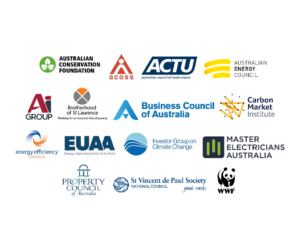29 May 2020

BUILDING A STRONGER AND CLEANER POST-PANDEMIC AUSTRALIA
Our diverse organisations together call for support for COVID economic recovery to urgently stimulate jobs and to rebuild a sustainable and strong economy.
Australia faces a public health emergency with immediate economic impacts as well as longer-lasting global economic pain. Beyond the pandemic, Australian prosperity also depends on dealing with other long-term challenges – including the transition to net zero emissions. Economic recovery efforts can and should contribute to addressing these long term challenges. Our organisations encourage governments to bolster their jobs and recovery strategies with measures to reduce emissions and accelerate successful energy transitions across all Australia’s regions and economic sectors.
There are many opportunities. One particularly promising area for investment is better energy efficiency and energy management. Useful upgrades could be made across Australia’s private and public housing; commercial, community and government buildings; and industrial facilities. Improvements could include more efficient and controllable appliances and major equipment, especially for heating and cooling; improved thermal envelopes and shading; smart meters and sub-metering; distributed energy generation and storage; fuel switching; and the equipment, training and external advice needed for better energy management.
If done well, these investments would durably lower energy bills; ease strains on a rapidly changing energy system; improve health and safety during increasingly hot summers; boost the competitiveness of local manufacturers, whose value to Australia is clearer than ever; enable deeper emissions cuts – and sustain activity across a broad range of trades and industries.
The International Energy Agency has highlighted that energy efficiency upgrades are job-intensive and strongly support economic stimulus goals. In Australia, a major drive to improve the energy efficiency of buildings and industry could deliver over 120,000 job-years of employment. Support for upgrades and new construction of public, low income and vulnerable housing would also help those most affected by pandemic restrictions and lift their purchasing power. Support for upgrades and new construction of private housing would also capitalise on people’s renewed interest in improving their homes, driving additional private investment. Support for commercial and industrial efficiency would cut operating costs and make investment and employment easier to sustain.
Positive examples to build on include:
- Housing: the Clean Energy Finance Corporation has supported construction of hundreds of 7‑star efficiency affordable housing units by St George Community Housing in Sydney, and with additional investment from New South Wales Government supported upgrades and installation of solar PVs of 700 existing units, providing energy bill savings of up to $500 per household.
- Commercial buildings: in 2017 the Victorian Government supported an energy upgrade to the MCG that cut its energy use by 24 per cent, enough to power 1872 houses a year.
- Industry: in 2019 ARENA identified already-economic opportunities to save the equivalent of 12% of industrial gas use for heat.
- Government buildings: the Victorian Government is investing $7 million to improve health facilities in the Mornington Peninsula region, which will improve front-line services and cut their energy bills by $1.2 million a year.
Governments should also look for other options that can support economic recovery and energy transition. The Federal and State Governments should integrate recovery plans with their respective clean technology roadmaps and long term emissions strategies, grid modernisation planning, carbon farming development and bushfire recovery to build greater resilience and reduce climate risk.
Investments will work best with careful design and discussion with regulators, business and the community. Equity and accessibility are essential to ensure that the most vulnerable benefit fully.
We are confident that smart, swift and sustained responses can speed the recovery and put Australia’s future growth on stronger foundations.
Endorsed by:
| Kelly O’Shanassy
CEO Australian Conservation Foundation
|
Cassandra Goldie
CEO Australian Council of Social Service
|
Michele O’Neil
President Australian Council of Trade Unions
|
| Sarah McNamara
Chief Executive Australian Energy Council
|
Innes Willox
Chief Executive Australian Industry Group
|
Conny Lenneberg
Executive Director Brotherhood of St Laurence
|
| Jennifer Westacott
CEO Business Council of Australia
|
John Connor
CEO Carbon Market Institute
|
Luke Menzel
CEO Energy Efficiency Council
|
| Andrew Richards
CEO Energy Users’ Association of Australia
|
Emma Herd
CEO Investor Group on Climate Change
|
Malcolm Richards
CEO Master Electricians Australia
|
| Ken Morrison
Chief Executive Property Council of Australia
|
Toby oConnor
National Council CEO St Vincent de Paul Society
|
Dermot O’Gorman
CEO WWF-Australia
|
Contact individual organisations for comment:
Australian Conservation Foundation Josh Meadows, 0439 342 992
Australian Council of Social Service Monique Vandeleur, 0419 626 155
Australian Council of Trade Unions Peter Green, 0400 764 200
Australian Energy Council Carl Kitchen, 0401 691 342
Australian Industry Group Anthony Melville, 0419 190 347
Brotherhood of St Laurence Bridie Riordan, 0491 159 256
Business Council of Australia Rheuben Freelander, 0417 814 904
Carbon Markets Institute Clare Price, 0490 252 743
Energy Efficiency Council Luke Menzel, 0433 237 293
Energy Users’ Association of Australia Emily Wood, 0421 042 121
Investor Group on Climate Change Tom Arup, 0402 482 910
Master Electricians Australia Mitch Collier, 0410 768 072
Property Council of Australia Matt Francis, 0467 777 220
St Vincent de Paul Society Gavin Dufty, 0439 357 129
WWF Australia Paul Fahy, 0455 528 161
Statement – pandemic response and long term priorities
Statement – pandemic response and long term priorities ACCESSIBLE VERSION